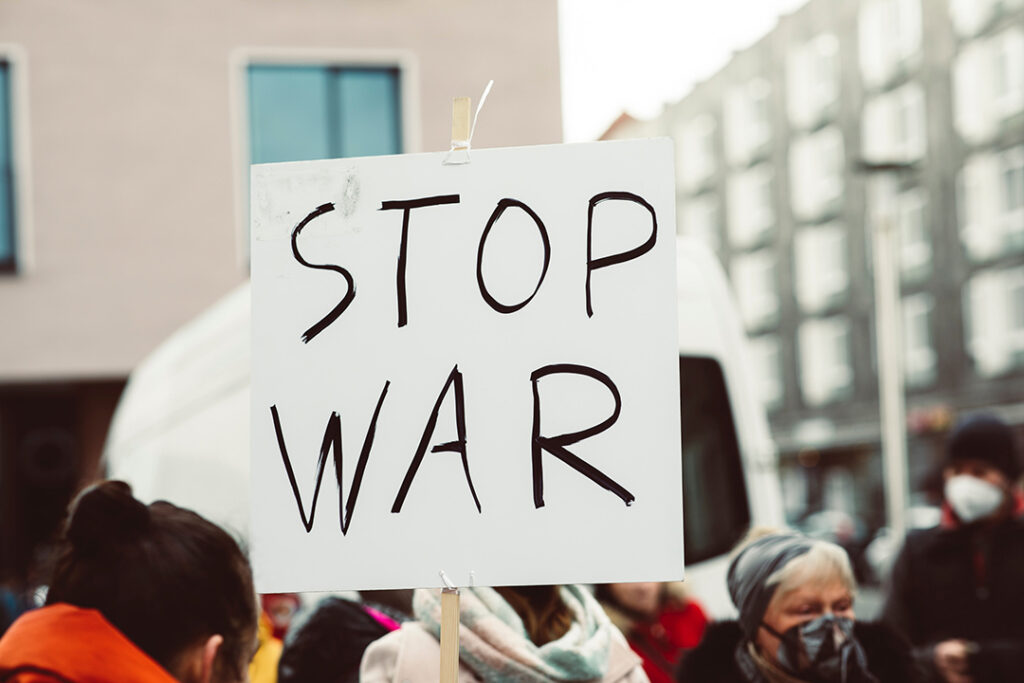Russian war propaganda: A crusade against evil
Russian war propaganda: A crusade against evil
Russian propaganda portrays the war against Ukraine as a crusade against evil. What moral worldview is behind this narrative?
Russian Orthodox clerics suspected of siding with Moscow
On November 22nd, 2022, the Ukrainian security service SBU raided and searched the famous Kyiv Monastery of the Caves. Here, SBU agents found a Ukrainian man suspected of working for a pro-Russian news agency, as well as several people with Russian or forged passports.[1]
In recent months, the Ukrainian media has issued reports of Russian Orthodox priests who seem to be siding with Russia. The SBU searched over 350 Russian Orthodox church buildings on suspicion of pro-Russian activities, like propagating pro-Russian messages and offering shelter to people with close ties to Russia. The churches in question all fall under the Moscow Patriarchate, which openly supports the war against Ukraine.[2]
On December 2nd, 2022, Ukrainian president Volodymyr Zelenskyy announced that churches that refuse to cut ties with the Moscow Patriarchate would be sanctioned. After the numerous raids of Russian Orthodox parishes, the SBU instructed the Ukrainian parliament to draft a new law. This new law prohibits churches from having connections with Moscow. Zelenskyy calls the law a necessary measure to prevent Moscow from “weakening Ukraine from the inside.”[3]
War propaganda of the Russian Orthodox Church
It stands to reason that Ukraine is suspicious of the Moscow Patriarchate. The Russian Orthodox Church in Moscow supports the Russian war against Ukraine and even propagates a narrative that justifies it. This narrative portrays the war as a crusade against the “amoral” West.[4] Patriarch Kirill, spiritual leader of the Moscow Patriarchate, declared that Russia ought to defend itself from the “profane” influences of Western culture. He hereby alludes to the acceptance of LGBTQ+ and the celebration of Pride events.[5] Kirill speaks of the war as “a struggle of metaphysical importance.”[6] According to Russian propaganda, the war serves the “desatanisation” of Ukraine, with Putin as the prime exorcist leading the country to salvation.[7]
A Russian priest and television presenter recently travelled to occupied territory in Ukraine for a television program called The War and the Bible. This program was broadcast on SPAS, the main channel of the Russian Orthodox Church. SPAS is known to express explicit support for the Russian invasion. In The War and the Bible, the priest and the presenter discuss “God’s intentions” with the war against Ukraine. They refer to Putin as a guardian angel protecting their country. In their view, Russia is fighting a “holy war” against the morally depraved West, which has abandoned religious and traditional values. They even discuss “God’s command to the Jewish people in the Old Testament to purify the earth from ungodly nations.”[8]
A narrative of sin
Russian war propaganda seems to build on a particular idea of morality: an ethic of divinity. According to the ethic of divinity, people need to steer clear from sin, for sin pollutes our God-given souls. To avoid spiritual pollution, people should follow particular moral regulations. Individuals cannot use their bodies to do whatever they like; they have to adhere to religious laws relating to food, sexuality, and other spiritually significant matters. Those who do not live according to these laws are believed to live in an ungodly way.[9]
In March 2022, Patriarch Kirill delivered a sermon in which he referred to homosexuality as “a violation of God’s law.”[10] The Russian narrative, as propagated by the Russian Orthodox Church, tells us that homosexuality is “sinful” and “ungodly.” Because Western culture is generally accepting of homosexuality, Russian propaganda portrays the West as amoral, lacking morality, even evil.[11]
Whereas the Russian narrative presents this practice as opposed to morality, the West tends to view LGBTQ+ rights as required by morality. This is because Western culture leans towards a different idea of morality: the ethic of autonomy. The ethic of autonomy is about the protection of individuals. It is about freedom of choice, justice, and individual rights. This idea of morality is secular and individualist. It is not concerned with religious or spiritual laws. Rather, it is about protecting the individual from harm perpetrated by others. According to the ethic of autonomy, individuals can do whatever they wish, as long as they do not harm other people.[12]
Different moral worlds
Where the ethic of divinity perceives homosexuality as sinful, the ethic of autonomy requires equal rights for those who identify as LGBTQ+. There is an obvious conflict between these two ideas of morality. By the same token, there is a conflict between the Russian world and Western culture. The Russian narrative and Western perspective clash because they envision different moral worlds. This tension indicates that morality is a major motivation for the ongoing Russia-Ukraine war.
Want to learn more about similar topics? Explore the EARS Dashboard
Sources
[1] Moskou woedend over Oekraïense invallen in kerken bij collaboratie-onderzoek
[2] Moskou woedend over Oekraïense invallen in kerken bij collaboratie-onderzoek
[3] Oekraïne sanctioneert kerken die banden met Moskou niet willen verbreken
[4] De rol van de kerk in de vuile Russische strijd is ronduit schokkend
[5] Anti-homopreek van patriarch schreeuwt om weerwoord
[6] Tensions in Eastern Europe and LGBTQ+ rights
[7] De Duiven bevechten met Satan aan je zijde
[8] Televisiezender van Russisch-Orthodoxe Kerk brengt oorlogspropaganda
[9] When Morality Opposes Justice: Conservatives Have Moral Intuitions that Liberals may not Recognize
[10] Russian Orthodox Church Leader Blames Invasion on Ukraine’s ‘Gay Pride’
[11] De rol van de kerk in de vuile Russische strijd is ronduit schokkend
[12] When Morality Opposes Justice: Conservatives Have Moral Intuitions that Liberals may not Recognize






